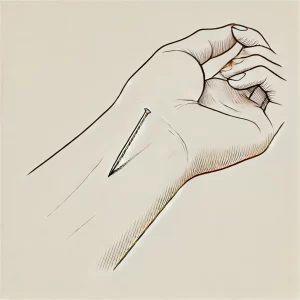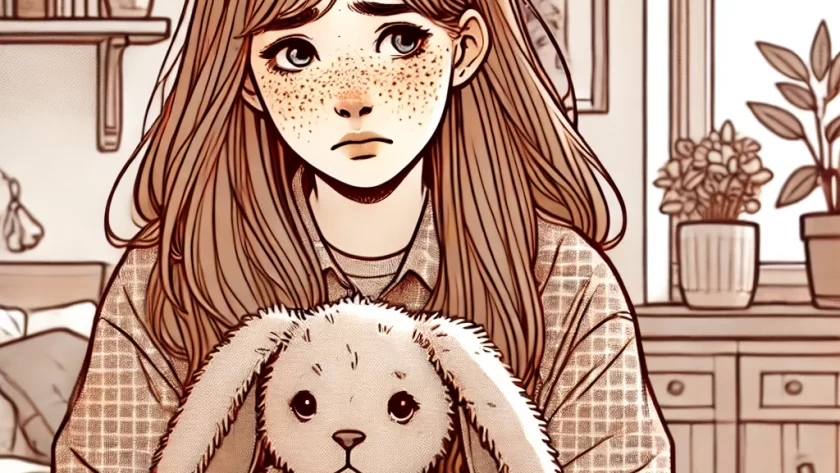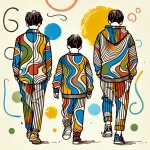そばかす [Sobakasu]
JUDY AND MARY [Judy and Mary]
Words : YUKI [Yuki]
Music : 恩田快人 [ONDA Yoshihito]
Following yesterday’s Spitz, here’s another band that represents the 1990s. Judy and Mary aren’t a duo, but a four-member rock band with Yuki on vocals, Takuya on guitar (same name as me!), Yoshihito Onda on bass, and Kōta Igarashi on drums, with Yuki being the only female member. The band’s name reflects the concept of a duality in the female vocalist, likened to two girls.
“Sobakasu” was released in 1996 as their ninth single. It became a million-seller as the first opening theme for the TV anime Rurouni Kenshin wiki. You might already know Rurouni Kenshin, a popular manga about a swordsman in the Meiji era. However, the song wasn’t written with the anime in mind, and the lyrics have nothing to do with the anime’s storyline.
大キライだったそばかすをちょっと
dai kirai datta sobakasu o chotto
ひとなでしてタメ息をひとつ
hito nade shite tame iki o hitotsu
- 大(だい) [dai] : very, extremely
- 嫌い(きらい) [kirai] : dislike
- そばかす [sobakasu] : freckles
- ちょっと [chotto] : a little
- ひとつ [hitotsu] : one
- 撫でる(なでる) [naderu] : stroke
- ため息(ためいき) [tameiki] : sigh
(translation) “I used to really dislike my freckles,
but I stroke them gently and let out a little sigh.”
“大嫌い / daikirai” (=really dislike) is a stronger expression than “嫌い / kirai” (=dislike). It’s useful to remember this in the same way as “大好き / daisuki” (=love) is stronger than “好き / suki” (=like).
“そばかす / sobakasu” (=freckles) refers to the freckles that often trouble adolescent girls. They are more common among Caucasians, though some Japanese people do have them as well.
The “ひと / hito” in “ひとなで / hitonade” is the same as in “ひとつ / hitotsu” (=one). It means “a little” and is used before nouns to indicate a small or gentle action.
ヘヴィー級の恋はみごとに
hevī-kyū no koi wa migoto ni
角砂糖と一緒に溶けた
kakuzatō to issho ni toketa
- ヘビー級 [hevī-kyū] : heavyweight
- 恋(こい) [koi] : love
- みごとに [migoto ni] : splendidly, completely
- 角砂糖(かくざとう) [kakuzatō] : sugar cube
- 一緒に(いっしょに) [issho ni] : together with
- 溶ける(とける) [tokeru] : melt
(translation) “My heavyweight love completely
melted, just like a sugar cube.”
前よりももっと やせた胸にちょっと
mae yori mo motto yaseta mune ni chotto
“チクッ”っとささるトゲがイタイ
“chiku” tto sasaru toge ga itai
星占いも あてにならないわ
hoshi uranai mo ate ni naranai wa
- 前(まえ) [mae] : before
- より [yori] : more than
- もっと [motto] : more
- 痩せる(やせる) [yaseru] : lose weight
- 胸(むね) [mune] : chest
- ちくっと [chikutto] : prick
- 刺さる(ささる) [sasaru] : stab
- とげ [toge] : thorn
- 痛い(いたい) [itai] : painful
- 星占い(ほしうらない) [hoshi uranai] : horoscope
- 当てにならない(あてにならない) [ate ni naranai] : unreliable
(translation) “A thorn pricks my chest,
which has grown even thinner than before, and it hurts.
My horoscope is no help at all.”
“ちく / chiku” is an onomatopoeia used to describe the sensation of something sharp pricking. It can also be said as “ちくちく / chikuchiku.” The “と / to” is a word that turns the onomatopoeia into an adverb.

“わ / wa” is a sentence-ending particle used to express femininity.
もっと 遠くまで 一緒にゆけたら ねぇ
motto tōku made issho ni yuketara nē
うれしくて それだけで
ureshikute sore dake de
- 遠く(とおく) [tōku] : far away
- 行く(いく・ゆく) [iku / yuku] : go
- ねえ [nē] : hey
- 嬉しい(うれしい) [ureshii] : happy
- それだけ [sore dake] : just that
(translation) “If we could go farther together, hey,
just that would make me happy.”
“iku” and “yuku” have completely different pronunciations, but both are used in the same way to mean “go.” Especially in poetry and lyrics, “行く” is often written and pronounced as “yuku.” “iku” is closer to colloquial speech, and people don’t say “yuku” in everyday conversation. In school, you’re generally taught that “行く” should be read as “iku.”
By the way, “言う” (=say) is sometimes pronounced as “yuu” in casual speech, but writing it as “ゆう / yuu” is considered incorrect (and a bit foolish).
It’s a bit confusing.
想い出はいつもキレイだけど
omoide wa itsumo kirei dakedo
それだけじゃ おなかがすくわ
sore dake ja onaka ga suku wa
- 思い出(おもいで) [omoide] : memory
- いつも [itsumo] : always
- 綺麗(きれい) [kirei] : beautiful
- それ [sore] : that
- だけ [dake] : only
- おなか [onaka] : stomach
- おなかがすく [onaka ga suku] : be hungry
(translation) “Memories are always beautiful, but
just that makes me hungry.”
This reminds me of the Japanese saying “花より団子 / hana yori dango” (=Dango, a Japanese sweets, over flowers), which expresses the idea of valuing practicality over aesthetics. However, in this case, it seems like her love has faded rather than her appetite winning out.

本当は せつない夜なのに
hontō wa setsunai yoru na no ni
どうしてかしら?
dōshite kashira?
あの人の笑顔も思いだせないの
ano hito no egao mo omoidasenai no
- 本当は(ほんとうは) [hontō wa] : actually
- せつない [setsunai] : heart-wrenching
- 夜(よる) [yoru] : night
- どうして [dōshite] : why
- あの [ano] : that
- 人(ひと) [hito] : person
- 笑顔(えがお) [egao] : smile
- 思い出す(おもいだす) [omoidasu] : recall
(translation) “Even though it’s actually a heart-wrenching night,
why can’t I remember that person’s smile?”
“かしら / kashira” and the “の / no” in “思い出せないの / omoidasenai no” are both sentence-ending particles that express femininity. The use of these words in an energetic rock song feels characteristic of Judy and Mary.
こわして なおして わかってるのに
kowashite naoshite wakatteru no ni
それがあたしの性格だから
sore ga atashi no seikaku dakara
もどかしい気持ちで あやふやなままで
modokashii kimochi de ayafuya na mama de
それでも イイ 恋をしてきた
soredemo ii koi o shite kita
- 壊す(こわす) [kowasu] : break
- 直す(なおす) [naosu] : fix
- わかっている [wakatteru] : understand
- あたし [atashi] : I (female)
- 性格(せいかく) [seikaku] : personality
- もどかしい [modokashii] : frustrating
- 気持ち(きもち) [kimochi] : feelings
- あやふや [ayafuya] : vague
- まま [mama] : as it is
- それでも [soredemo] : even so
- いい [ii] : good
- する [suru] : do
(translation) “Even though I know I keep breaking and fixing things,
that’s just my personality.
I’ve had frustrating feelings and left things vague,
but still, I’ve had good loves.”
おもいきりあけた左耳のピアスには ねぇ
omoikiri aketa hidari mimi no piasu ni wa nē
笑えない エピソード
waraenai episōdo
- 思い切り(おもいきり) [omoikiri] : with all one’s strength
- 空ける(あける) [akeru] : to pierce, to open
- 左(ひだり) [hidari] : left
- 耳(みみ) [mimi] : ear
- ピアス [piasu] : earring, piercing
- 笑う(わらう) [warau] : to laugh
- エピソード [episōdo] : episode
(translation) “The piercing I made in my left ear with all my strength, hey,
has an episode that’s no laughing matter.”
I didn’t quite understand, so I looked it up, and it seems that there was once a culture, especially in the West, where the position of a piercing held specific meanings. A piercing in the left ear, for instance, was seen as a sign of being a lesbian. This may have differed depending on the country or region, and it might be outdated now.
The “ねぇ / nē” here seems to carry the meaning of “You get it, right? Can’t you tell without me saying it?”
そばかすの数をかぞえてみる
sobakasu no kazu o kazoete miru
汚れたぬいぐるみ抱いて
yogoreta nuigurumi daite
胸をさす トゲは 消えないけど
mune o sasu toge wa kienai kedo
カエルちゃんも ウサギちゃんも
kaeru-chan mo usagi-chan mo
笑ってくれるの
waratte kureru no
- 数(かず) [kazu] : number
- 数える(かぞえる) [kazoeru] : count
- 汚れた(よごれた) [yogoreta] : dirty
- ぬいぐるみ [nuigurumi] : stuffed toy
- 抱く(だく) [daku] : hold
- 胸(むね) [mune] : chest
- 刺す(さす) [sasu] : stab
- 消える(きえる) [kieru] : disappear
- カエル [kaeru] : frog
- うさぎ [usagi] : rabbit
(translation) “I try counting the number of my freckles,
holding a dirty stuffed toy.
The thorn in my chest won’t disappear, but
even Frog-chan and Bunny-chan
smile for me.”
The “ちゃん / chan” is a suffix added to names to express affection. It is often used for girls, but it’s also perfectly fine to use it for animals or stuffed toys.
Speaking of frog mascots, “Keroppi web” is one that was once incredibly popular. It’s one of the many mascots created by Sanrio web, the company behind Hello Kitty web.
As for rabbits, the Dutch character Miffy is famous, but Sanrio also has their own rabbit mascot called “My Melody web.”
By the way, the album The Power Source, which includes the song “Sobakasu,” features what seems to be a teddy bear on its cover. These girlish elements are a part of Judy and Mary’s charm.

想い出はいつもキレイだけど
omoide wa itsumo kirei dakedo
それだけじゃ おなかがすくの
sore dake ja onaka ga suku no
本当はせつない夜なのに
hontō wa setsunai yoru na no ni
どうしてかしら? あの人の涙も思いだせないの
dōshite kashira? ano hito no namida mo omoidasenai no
- 涙(なみだ) [namida] : tears
(translation) “Memories are always beautiful, but
just that makes me hungry.
Even though it’s actually a heart-wrenching night,
why is it? I can’t even remember that person’s tears.”
思いだせないの Wo…
omoidasenai no
ララララララ
rararararara
どうしてなの?
dōshite na no
There are no official videos on YouTube, but you can find live performances where you can see Yuki’s powerful yet adorable stage presence. In fact, her singing might even be better live. Takuya’s free-flowing backing is also excellent.
YouTube Search “Sobakasu – Judy and Mary”
Thanks for reading! Feel free to comment if you have any feedback or questions.
Follow me on X.



